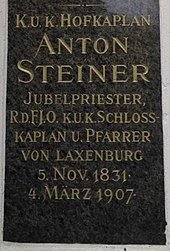Chaplain
![]()
This article is about an ecclesiastical office; for the personal name see Chaplain (name), for other meanings see Chaplain (disambiguation).
![]()
This article or subsequent section is not sufficiently supported by evidence (e.g., anecdotal evidence). Information without sufficient evidence may be removed in the near future. Please help Wikipedia by researching the information and adding good supporting evidence.
Chaplain (from Latin capellanus "cleric assigned to a (Frankish) court chapel", from Middle High German kaplan) is an ecclesiastical office in the Roman Catholic Church. In Middle Latin, a capellanus is an assistant priest. His dwelling is sometimes called a "chaplaincy".
According to cann. 564-572 CIC, this refers to a priest with an extraterritorial pastoral care of a specific group of persons, such as in hospitals, prisons or military institutions. In most German dioceses, however, it is customary to confer the title pastor on these pastoral workers (for example, hospital pastor, prison pastor, or military pastor), although no parochial rights can be derived from this title.
In the German-speaking world, the term chaplain is also used for a parochial vicar who, in the first years after his ordination to the priesthood, is subordinate to a parish priest and does not yet have sole responsibility for a parish; during this time he is supposed to gain the necessary experience and therefore partly takes over tasks of the parish priest. In earlier times most parishes also had a chaplain, and sometimes in large parishes there were several. Today, due to the decrease in the number of young priests, they are rarely found.
Depending on local custom, in some dioceses the chaplain is called vicar as an associate of a parish priest - a designation which the Codex Iuris Canonici 1983 provides for this function: vicarius paroecialis. In the Bavarian-speaking area and in the diocese of Trier, the term Kooperator (co-worker of the parish priest) is usually also used. In the Archdiocese of Vienna the assistant clergy in the parishes were called cooperators or cooperators until 1938. By resolution of the Austrian Bishops' Conference of September 28, 1938, the German term Kaplan was adopted. The terms adjunct and supernumerarius became completely uncommon. In parishes with several assistant priests, the youngest was formerly called "adjunct", another "vicar" and the oldest "chaplain".
The chaplains of the diocesan bishops are all secretaries at the same time, because they work on behalf of the bishop and in this sense are subject to secrecy. However, these are usually not, as in parishes, young priests who take on this office for training, but already experienced clergy.

Tomb of the Imperial Court Chaplain Anton Steiner, Vienna Central Cemetery
Search within the encyclopedia